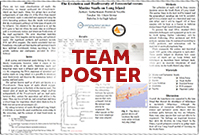
Team Info
- Program:
- Barcode Long Island
- Year:
- 2024-25
- Research Topic:
- Biodiversity & trade
- Taxonomic Group Studied:
- Animals: Invertebrate
Project:
A study of the signcanct and rapid effect of human activities on biodiversity in aquatic macroinvertebrate ecosytems using DNA b
- Students:
- Viviana Bright, Julia Innes, Christa Littlefield, Elena Lopez
- School:
- Massapequa Ames High School, Nassau
- Mentors:
- August Eberling
Abstract:
Through this scientific investigation, the amount of biodiversity in Massapequa Preserve, a temperate deciduous forest with shallow freshwater bodies of water, will be found to the effect of human activity on their environment. Specifically, aquatic invertebrates that reside within the creeks and ponds. Shovels, nets, and sifters are used to collect the specimens which then will be drowned in alcohol to preserve their natural state. DNA barcoding is a vital method for finding biodiversity within the specimens. Finding DNA differences between already known species and the collected samples will help prove how biodiversity has changed and been affected by human activities like urbanization, overfishing, and pollution in once-diverse ecosystems. These findings are significant because they will prove the future of biodiversity differences and weaknesses due to unnatural outside activity. In all, invertebrate specimens from the water will be collected to obtain data on what exactly is going

